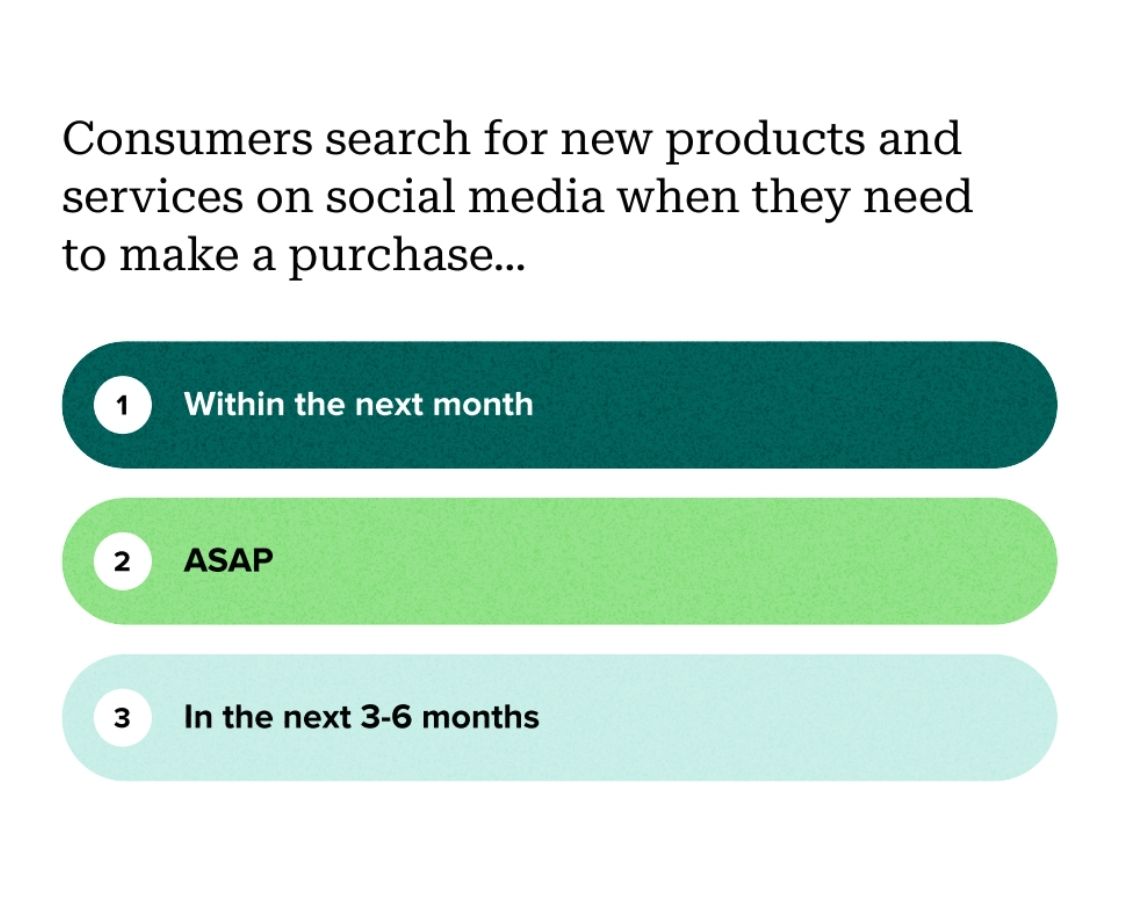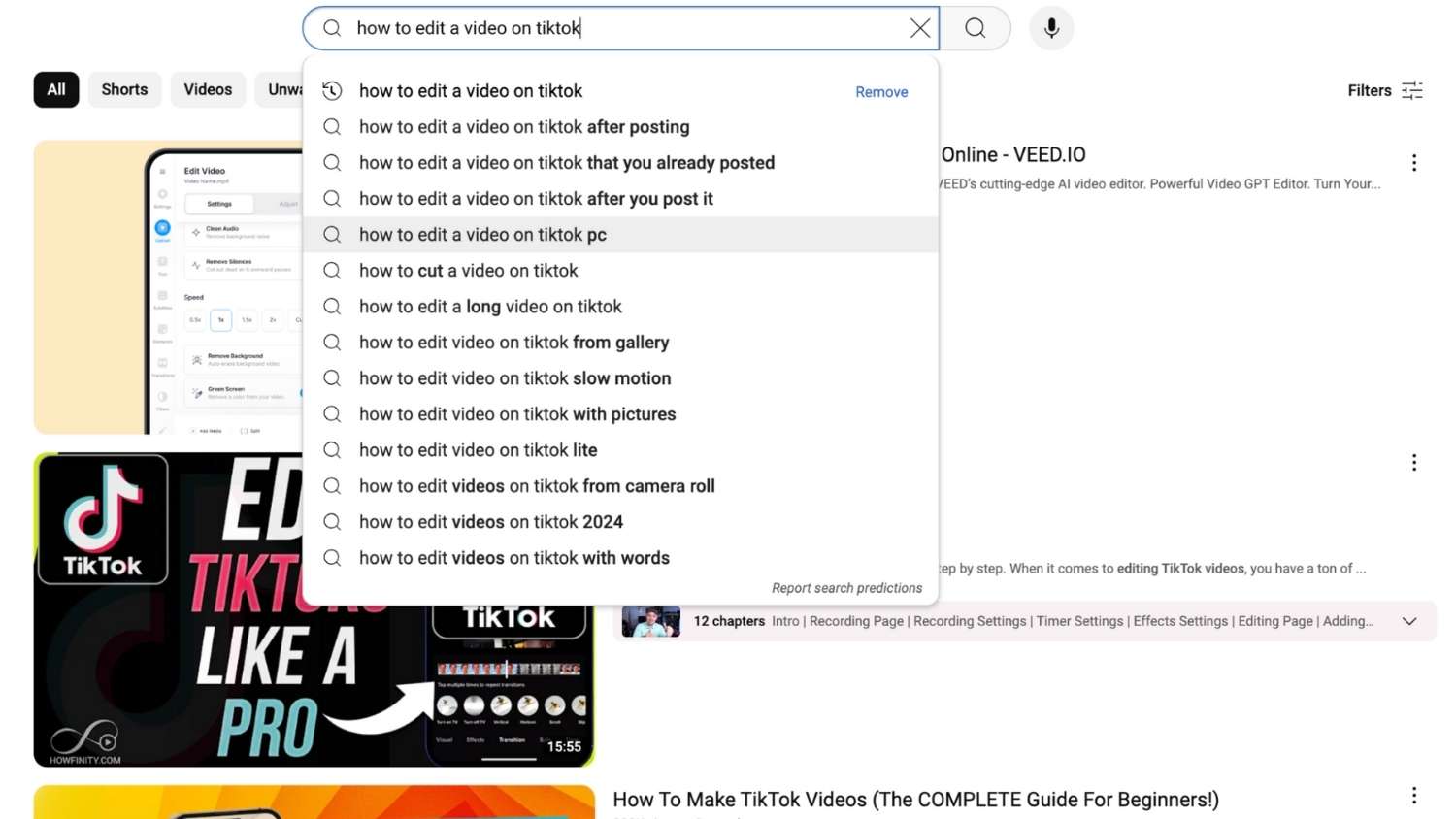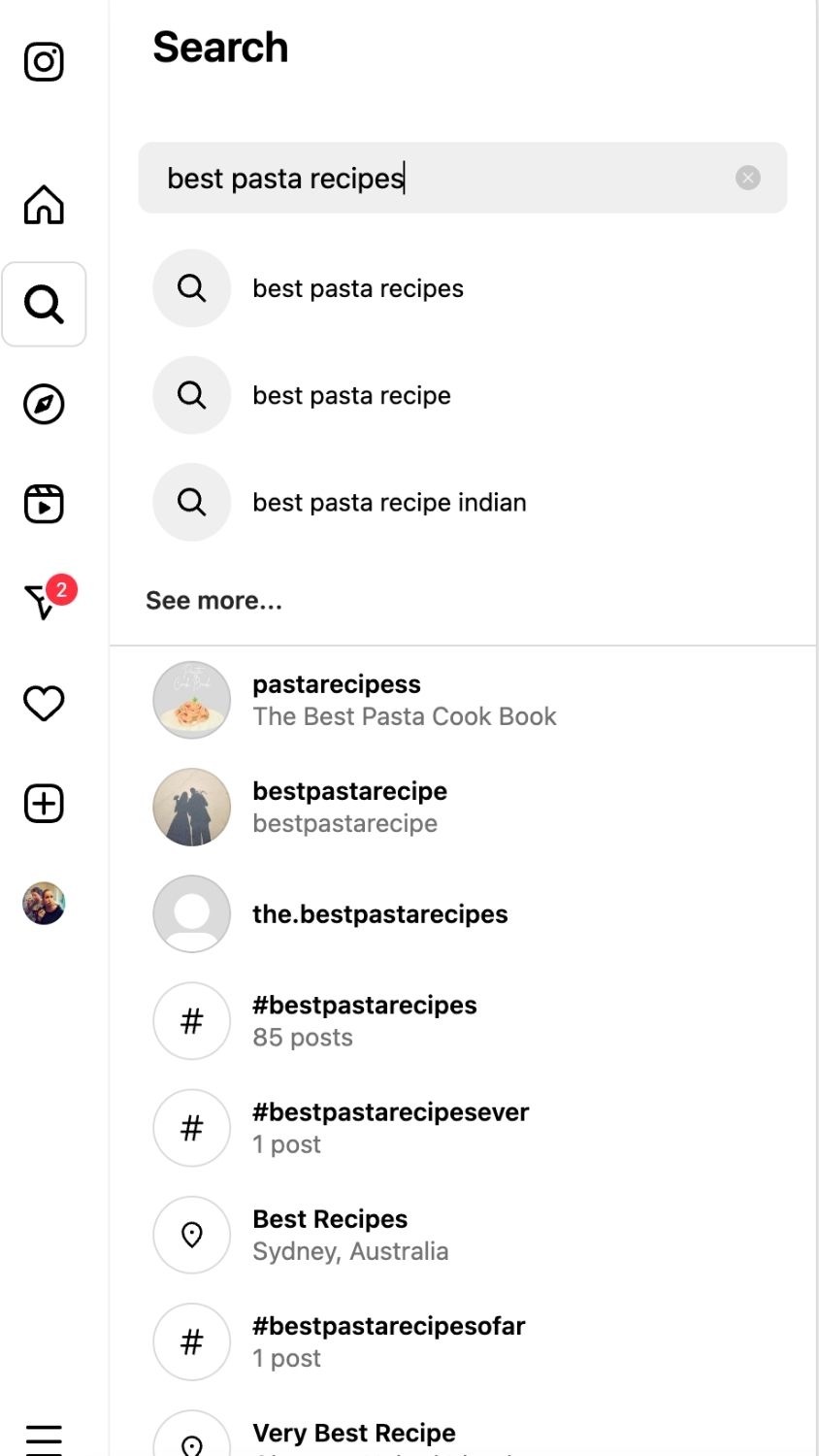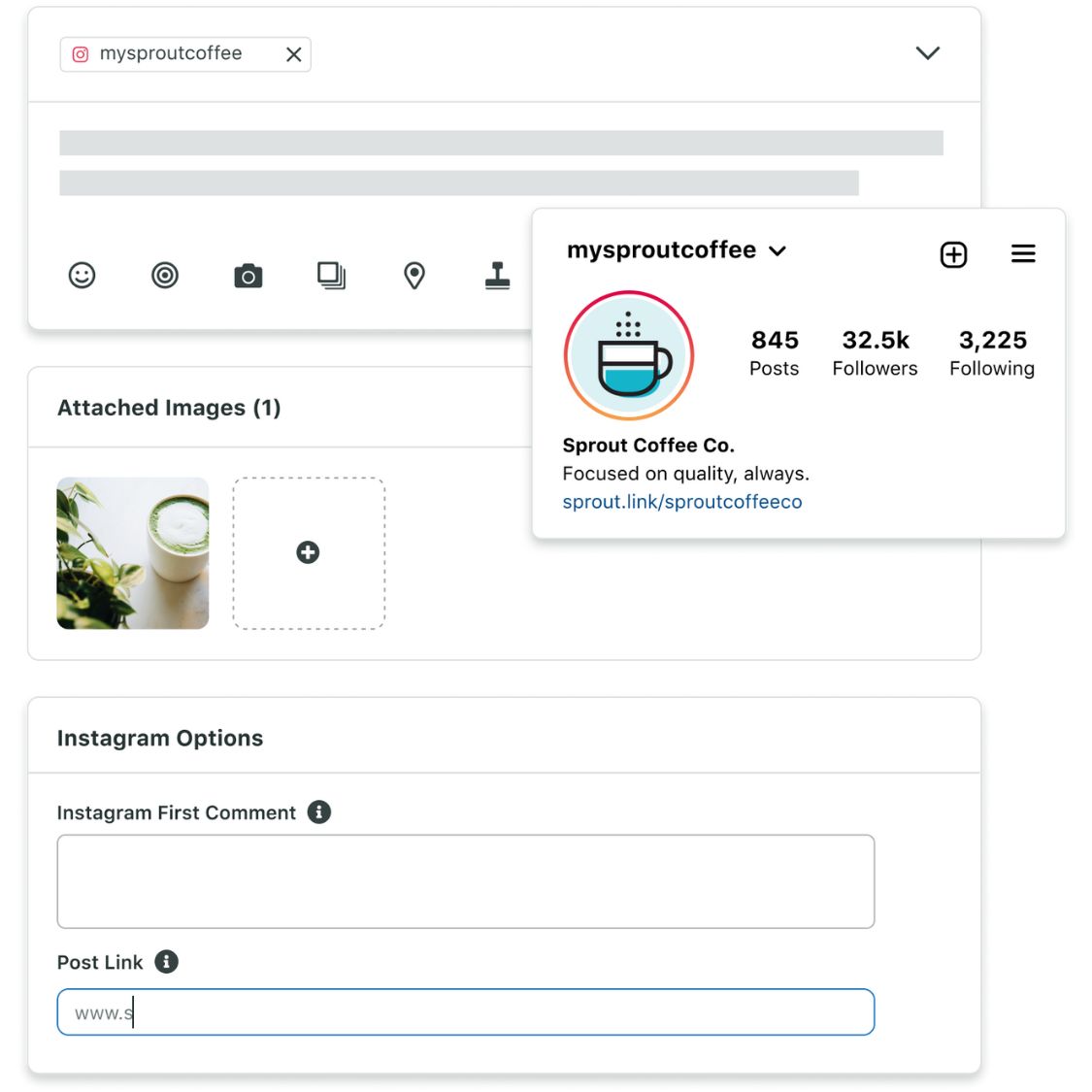
Social Media Search
Social media search: Everything to know in 2026
Your audience doesn’t just scroll on social media—they search. Are you showing up?
This article unpacks the rise of social search and how to adapt your strategy to capture high-intent customers. Download our Social Search Optimization Workbook to put these insights into action and start winning at social search.
Reading time 11 minutes
Published on October 7, 2025

Table of Contents
Summary
- Your audience is already using social media as a search engine. Integrate a social-first search strategy into your marketing efforts by optimizing your profiles and content with relevant keywords and hashtags to capture this high-intent audience.
- Go beyond vanity metrics and use social listening to understand what your audience is searching for. Analyze conversations, questions and sentiment around your brand and competitors to uncover valuable insights that can inform your content strategy and drive meaningful engagement.
- Move beyond purely promotional content and create valuable, "edutaining" (educational and entertaining) content that directly answers your audience's questions. By providing solutions and insights, you can position your brand as a trusted resource and build a loyal community.
Social search is rapidly evolving what the term “SEO” means. For millions of users, social platforms have become their primary search engine.
Sprout Social’s Q2 2025 Pulse Survey found that nearly one in three consumers skip Google altogether and instead start their search journey on networks like TikTok, Instagram or YouTube. What they’re searching for goes beyond entertainment: they’re looking for how-tos, product demos, peer validation and real solutions.
This means social search now fuels traditional SEO. Virality, engagement and social shares all signal authority, strengthen E-E-A-T and influence brand visibility. This shift invites marketers to take a closer look at how search factors into their social media marketing strategy. Here’s what you need to know.
What is social media search?
Social media search, or social search, is the practice of consumers using social networks to search for information. People use it to discover products, explore user experiences and uncover real-time trends.
Social media networks have evolved from places to connect with friends and family into powerful tools for consumer research. Today, buyers explore products, vet vendors and make purchasing decisions on social media.
This shift is led by younger consumers and driven by the desire for authentic, trustworthy content like user-generated content (UGC). Beyond just looking up brand names, people are searching for honest reviews, tutorials and visuals from real users, especially in the form of short-form videos.
When it’s time to make a purchase, consumers increasingly turn to social media to guide their decisions. The visual results there often feel more relevant and trustworthy than what they’d find on traditional search engines, especially when it comes to discovering and evaluating products.

And the shift from going to social search first is already significant.
According to Sprout Social’s Q2 2025 Pulse Survey, 41% of Gen Z have a social-first search mindset, and 37% of consumers in general use social media as their starting point for product research.
That behavior has real business impact: 76% of all consumers, rising to 84% of Millennials and 90% of Gen Z, say they’ve bought something in the last six months because of content they saw on social.
In the B2C and lifestyle sectors, the shift to social-first search on YouTube, Instagram and TikTok is already here. In B2B spaces, LinkedIn leads the way as a discovery engine for POV content, thought leadership and peer validation.
The takeaway: Social platforms are acting as social media search engines, and your brand’s discoverability depends on showing up where your audience searches first.
Why social search matters for your digital marketing strategy
In 2025, social search strategies for brands go beyond platform algorithms alone. When you build your content to be found, every post becomes a chance to grow.
That’s why brands that lean into social search benefit from stronger brand awareness, improved visibility and high-intent engagement with their traditional SEO strategy.
Here’s how these benefits break down for brands:
Boost in brand awareness and trust
Social-first brands grow faster, and social search plays a big role in that. According to Deloitte Digital, brands that are social first see 10% higher annual revenue growth by showing up inside conversations, creator content and communities.
They appear organically in feeds, comments and search results. That authenticity fuels credibility. And, when your brand’s content is optimized for the social networks your audience spends time on, your brand is easier for your audience to find and trust.
Increased visibility
Gen Z, along with a growing number of other consumers, turns to social media to search for everything from skincare to software. That shift makes social search a strategic advantage for brands that are showing up early, especially for B2C companies.
But social search doesn’t just stop with B2C. On LinkedIn, B2B buyers are also looking for peer-to-peer validation through POV content and solution-based posts. Even AI tools like ChatGPT are fueling this evolution, delivering outputs that spotlight brands’ social content (especially YouTube videos) that provide clear, visual answers.
Given these shifts, staying visible means staying aligned. SEO and social teams need shared keywords, unified messaging and a calendar that makes workflows easier to manage. The payoff is more eyes on your brand where users are searching.
High-intent discovery that drives action
Users decide which social network to turn to, whether it’s TikTok, Instagram, LinkedIn or Reddit, with specific intent. It depends on if they’re looking for tutorials, product reviews, local recommendations or other information from people they can trust online.
When your content meets a search query in real time, especially on short-form video platforms, you’re stepping in at the right moment with relevance that builds trust, sparks action and strengthens connection to your brand. That behavior creates a clear opportunity for conversion.
This is also particularly true for community-driven platforms where users seek unfiltered advice; mastering Reddit SEO allows brands to appear in these high-trust conversations right when a user is looking for a peer-vetted recommendation.
Cross-channel SEO and referral traffic
Social media search optimization techniques extend far beyond the platform. For example, a high-performing TikTok or Instagram post can generate backlinks, drive traffic and send referral clicks that boost your overall funnel.
Those strong social signals, as well as shares, comments and likes, feed the algorithms of traditional search engines, especially as Google has increasingly surfaced content from social networks in its search results over the years.
When your social media accounts align with SEO efforts, every post becomes a discovery tool. SEO and social teams that plan together gain a faster path to visibility and a stronger edge in organic growth.
Social media search optimization techniques for each channel
Discovery looks different on every platform, and success in social SEO depends on knowing what to prioritize. To improve your social search results, you should align your content with how people search and what each platform’s algorithm favors.
However, no matter what network you’re optimizing content for, starting off right means starting with the right keywords. Conducting keyword research to appear at the front of searches on social media, especially the ones of interest to your target audience, helps you optimize for what matters most to achieve your goals.
The keywords to discover aren’t just the keywords that relate to your brand’s core product or service offerings. It can also mean discovering keywords for trending topics to keep your brand current with what your audience is searching on social.
Once you have the keywords, you have the obvious opportunities to optimize your content for each network. Here are a few network-specific social search tips for marketers:
TikTok
To improve visibility in TikTok search results, remember these tips:
- Optimize your TikTok profile for attracting new users and boosting discoverability.
- Use captions and on-screen text that reflect natural search query phrasing to improve in-network visibility.
- Add TikTok hashtags, which often gain posts more traction, especially through trending topics.
- Remember that TikTok search favors content that keeps users watching and engaged. Hooks within the first three seconds help hit higher engagements, which increases the likelihood of TikTok’s algorithm picking up your post.
Here are some ways to help your content surface in Instagram search:
- Optimize your Instagram profile to be easily found by searchers. Use clear, searchable keywords in your handle, name and bio. If you’re a business account, this also improves discoverability on Google.
- Use Instagram hashtags to signal relevance to both the algorithm and searchers.
- Invest in creating high-quality content for Instagram posts. Engaging content, especially Reels, is vital for discoverability through Instagram’s algorithm.
- Use on-screen keywords in captions and overlays to strengthen content alignment with user queries.
YouTube
To stand out in YouTube search, consider the following approaches:
- Develop a YouTube marketing strategy that focuses on how-to and review content to align with search intent, though this varies by industry.
- Use Metadata with semantic yet targeted keywords to boost visibility in search engines and platform results. Accurate descriptions, uploading transcripts and keyword-rich filenames also contribute to effective YouTube SEO.
- Focus on boosting engagement signals. YouTube’s algorithm heavily prioritizes content based on how users engage with the platform.
To improve your Facebook SEO, here are a few core tips for optimization:
- Optimize your Page and the metadata of your Facebook posts.
- Ensure your Facebook posts have keyword-rich descriptions, titles and tags.
- Post fresh and engaging content consistently. Encourage comments, shares and saves as these signals help your content appear when people search related terms.
- Leverage Facebook Groups around your niche and post keyword-rich, high-value content there.
Reddit thrives on authenticity and community. Here’s how to show up in search there:
- Include keywords that your target audience is likely to search for in your post titles and the first few lines of your comments. Reddit search heavily relies on text matching.
- Keep your posts on theme or within the culture of the subReddits you’re posting in for increased visibility. This means using jargon that is relevant to the redditors in that subReddit. For example, if you were posting in r/Entrepreneur, you would replace using the phrase “starting a business” with “bootstrapping a startup” or “MVP launch.”
- Be mindful of bringing value and creating lively discussion. High engagement, like upvotes, comments and post freshness, increases visibility in search results.
These LinkedIn-specific strategies can help your content show up more often in relevant searches:
- Place keywords in important fields of your company page: description, specialities, tagline and services. And use keyword-driven post captions focused on questions, how-tos, trends and best-of lists.
- Use LinkedIn hashtags, which connect content to timely industry conversations.
- Include three to five relevant LinkedIn hashtags to help surface posts in relevant searches.
- Add alt text to images and videos to boost discoverability and improve accessibility.
Unlike other platforms, Pinterest acts as a visual discovery engine where people actively search for inspiration and products to buy. Top optimize your content for Pinterest search:
- Treat your profile like a sitemap by placing high-intent keywords in your board topics, Pin titles and descriptions so the Pinterest algorithm can accurately index your content.
- Enable Rich Pins to automatically sync website details like pricing and headlines, adding a layer of context that signals relevance and trust to the search algorithm.
- Prioritize visual quality with high-resolution, vertical images or videos, as the algorithm penalizes blurry or horizontal content even if the keywords are correct.
Put these principles into action by downloading our free Social Search Optimization Workbook to start strengthening your brand’s presence in social search results.
How social search and SEO work together
Do traditional search engines still matter? Yes, they do, but social networks are now major players in how people discover brands.
This more refined approach isn’t about abandoning Google SERPs. It’s about considering how to leverage the two channels to work together.
The sections below break down the key ways social media is reshaping organic visibility and offer insights into what your brand can do to tap into that opportunity.
Social search offers new entry points
Platforms like Reddit, YouTube, TikTok and Instagram are siphoning attention from Google. For instance, when users search for “best moisturizer for dry skin” or “budget Italy itinerary,” they often start with a TikTok or Instagram query, not a standard search engine. If your brand isn’t there, you’ll miss high-intent audiences at their most curious.
Social search provides opportunities for organic growth
Likes, shares, saves, clicks and other social signals build brand awareness. They signal authority to traditional search engines, which boosts content visibility beyond just social networks.
Social signals can also influence backlink generation. For example, content that gains traction on social media is more likely to earn mentions on blogs, get media attention or become a source on Reddit.
And now, AI-driven tools like ChatGPT pull data from high-performing social posts in addition to web pages. That means having an active, optimized presence on social media contributes to your brand visibility within social search, Google results and AI engines.
Social search is an opportunity to expand your brand-visibility real estate to all existing touchpoints of search.
Stronger ranking signals
Your social media accounts act as a source of authority across the web, and that authority starts with your profile. A verified, keyword-optimized profile builds foundational authority, while high-performing posts help reinforce your brand’s credibility across search engines, social networks and AI platforms.
Together, your profile and social posts influence what surfaces in high-intent moments, including discovery within a social network’s feeds to Google search results and AI summaries.
To stay ahead of what’s being surfaced, social listening tools help you monitor brand perception in real time and track how and where your content appears across networks.
Keyword collaboration
Collaboration between SEO and social teams has never mattered more, and it starts with a shared understanding of how people search. Tools like AnswerThePublic spark keyword ideas that map to both web and social media search behavior, making it easier to plan content that performs across channels.
This nuance is especially important now that Google search indexes content from Instagram, YouTube and other platforms. Starting with Google-friendly terms and adapting them for social search builds a bridge between ecosystems.
How to use Sprout for your social media search strategy
Search behavior changes quickly, but the right tools make it easier to keep up. That’s where Sprout comes in. It helps your team monitor audience behavior, analyze what’s working and build a content strategy that wins in both the feed and the SERP.
Here are four ways Sprout can support a stronger social media search strategy:
Act on search-driven trends
Trends don’t wait, and neither do audiences. With social listening, you can track how people are talking about the topics that matter most to your business. By starting with relevant keywords, themes or brand-specific terms, you’ll uncover the questions, sentiment and language your audience uses.
These insights become more powerful with AI-powered sentiment analysis and social listening tools that track trending phrases and real-time reactions. With them, you’ll see which queries are gaining traction and which trending hashtags are picking up steam. These kinds of real-time signals give you the context you need to reach users in the moment.
Engage authentically with your audience
Search engines favor content that people interact with. And in social media search, engagement acts as a signal. Comments, replies and reposts matter. When that interaction feels real (and not forced), algorithms notice. Every like or reply nudges your content higher in the feed and deeper into the search layer.
Sprout’s publishing tools let your team manage engagement at scale, while maintaining a consistent voice.
Sharpen your performance
Effective social media search optimization techniques start with knowing what’s working and why. That’s where Premium Analytics, an add-on feature within Sprout Social’s Reporting suite can be particularly effective. It provides additional metrics that can be added to charts and reports, and custom reporting to build out social-search specific reports if desired.
Layer in competitive analysis, and the picture gets even sharper. It shows where your brand fits, where others are succeeding and where there’s still room to stand out.
Reinforce credibility on your social profile
Social media accounts often serve as the first branded result that users encounter. That’s why details matter. Keyword-rich bios, updated links and clear, consistent branding all strengthen your presence across Google search, in-platform queries and AI-generated results.
To extend that visibility, Sprout’s Link in Bio feature provides a smoother path from search to action, giving users quick access to content, products or sign-ups without breaking the platform experience.
Leverage influencer partnerships
Influencers shape how users search, especially on platforms like TikTok and Instagram. So when brands collaborate with creators who rank in social search engines, they gain built-in trust and reach.
To make these partnerships more strategic, Sprout Social Influencer Marketing helps you assess which creators align with your audience and reinforce your E-E-A-T signals. For teams seeking a head start, our influencer Marketing Toolkit in particular offers a clear way in.
Prepare your strategy for the future of search
Social search is a real shift in how discovery works, which now starts in the feed, not the search bar. The brands that adapt their strategy around how people search (and how algorithms respond) are the ones that will stay visible.
To support that shift, Sprout offers social-first tools that align with how people discover and engage today. From publishing and analytics to social listening and influencer discovery, Sprout allows you to show up in feed-based search, track what social content and topics are gaining traction and adapt quickly as algorithms evolve.
Put these principles into action and download our free Social Search Optimization Workbook to start strengthening your brand’s presence in social search results.
Social media search FAQs
What kind of content performs best in social search results?
Content that matches users’ search intent and fits the platform usually ranks best. On TikTok and Instagram, short-form video, product demos and lifestyle posts from influencers tend to perform well. On YouTube, long-form tutorials and reviews lead. Posts with clear value, visual appeal and strong engagement are more likely to surface in results.
How is social search influencing customer behavior and the buyer journey?
Social media search brings high-intent users to your brand earlier in the journey. Instead of clicking a Google ad, they’re discovering you through creators, tutorials or community posts. This context shifts where purchase decisions happen and makes social media networks a vital part of your marketing funnel.
What role do keywords and hashtags play in social search?
Hashtags and keywords help platforms interpret and serve relevant results, just like a traditional search engine. Using natural phrasing in captions, bios and alt text improves discoverability, while platform-specific tags boost reach. For more insight, explore Sprout’s guides to Facebook hashtags and Instagram Reel hashtags.
What are the best tools for social search research and monitoring?
Tools like AnswerThePublic show popular query patterns. Pair that with real-time insights from social listening, sentiment analysis and competitive analysis and benchmarking through a platform like Sprout Social to track trends and shape smarter content across platforms.
Additional resources for Social Media Search
Why social search for B2B ecommerce is the new key to credibility and conversion
How the TikTok algorithm works in 2026
B2B SEO: How to turn search intent into revenue with a social-first approach
The YouTube algorithm: how it works and tips to optimize in 2026
What local SEO is and how to improve your local ranking
Bluesky SEO: Your guide to social search and discoverability
Threads SEO: The missing link in your social media marketing strategy
The Instagram algorithm: How it works and strategies for 2026
The complete guide to keyword research for social media
How the LinkedIn algorithm works in 2026
Influencer marketing and SEO: Building lasting visibility
How to win with the Pinterest algorithm in 2026
Substack SEO: A guide to grow newsletter reach and visibility
Twitter SEO: How to boost visibility on X and Google
YouTube SEO in 2026: Boost video visibility on YouTube and Google
The 10 best Reddit SEO strategies to maximize your brand’s visibility
SEO and social media: How to amplify your visibility
Social media search: Everything to know in 2026
TikTok SEO: The essential guide for brands in 2026
Instagram SEO strategies for in-app and search engine discoverability
How the Facebook algorithm works and ways your brand can outsmart it


























Share